TRANSPORTATION INFRASTRUCTURES WITH ANTULIO RICHETTA | E004 PODCAST
LISTEN TO THIS EPISODE ON ALL STREAMING SERVICES
ABOUT THE GUEST
Antulio Richetta sits down with George Stroumboulis to discuss the business of Transportation.
Antulio Richetta has a Master of Science in Transportation from the Massachusetts Institute of Technology and specializes in ITS, Motorway Concessions, Toll and Motorway Management Systems, Information Technology Applied to Transportation Systems, Intermodal Systems and Transport Systems Analysis.
Antulio is currently responsible for several Motorway Concession Toll, Motorway Management and Communications Systems deployments in Greece and as part of his ITS-related experience, he has led key projects in several cities worldwide including the Athens Traffic Management and Signal Study for the Athens 2004 Olympic Games, the Automated Traffic Violations Administering and Monitoring in Saudi Arabia, and the Beirut Traffic Management Program.
His technical experience extends to areas of the Transportation sector, where he was responsible for the Attiki Region Public Transport Masterplan, and Airport Masterplan projects for Santorini and Tripoli in Greece.
COMPANY: https://www.ibigroup.com/
LINKEDIN: https://www.linkedin.com/in/richetta/
“although we are a technology design company and driven by technology and engineering, we still know and keep the human factor and the human relationship as our primary.”
MEDIA RELATED TO THE EPISODE
George Stroumboulis discussing with Antulio Richetta at the Ideoli Europe offices about the business of engineering and transportation in Southeast Europe.
Antulio Richetta is the first guest on the podcast being filmed out of Athens, Greece. He has been living here for 25+ years, originally from Venezuela, Latin America.
George Stroumboulis hosts Antulio in his new Athens, Greece office for their podcast discussion. George’s company, Ideoli Group, has been doing business indirectly with IBI Group in Toronto, Canada.
ABOUT THE “INVIGORATE YOUR BUSINESS” PODCAST
The Invigorate Your Business with George Stroumboulis podcast features casual conversations and personal interviews with business leaders in their respective fields of expertise. Crossing several industry types and personal backgrounds, George sits down with inspiring people to discuss their business, how they got into that business, their path to the top of their game and the trials and tribulations experienced along the way. We want you to get inspired, motivated, and then apply any advice to your personal and professional lives. If there is at least one piece of advice that resonates with you after listening, then this podcast is a success. New episodes weekly. Stream our show on Spotify, YouTube, Apple, Amazon and all other platforms.
ABOUT GEORGE STROUMBOULIS
George Stroumboulis is an entrepreneur to the core, having launched several ventures across multiple industries and international markets. He has held senior-level positions at progressive companies and government institutions, both domestically and internationally, building an extensive portfolio of business know-how over the years and driving profit-generating results. George’s ability to drive real change has landed him in several media outlets, including the front page of the Wall Street Journal. George was born in Toronto, Canada to his Greek immigrant parents. Family first. Flying over 300,000 miles a year around the world puts into perspective how important family is to George’s mental and emotional development. With all this travel to global destinations, the longest he stays even in the most far-out destination is 3 days or less - a personal rule he lives by to make sure he is present and involved in family life with his wife and three daughters. To read about George’s global travels, stay connected with his blog section.
STAY CONNECTED WITH GEORGE STROUMBOULIS
STREAM & LISTEN TO THE PODCAST:
SPOTIFY: https://open.spotify.com/show/1rW2CmxQoiJNEPOZupJlvd
YOUTUBE: https://www.youtube.com/user/Stroumboulis
APPLE iTUNES: https://podcasts.apple.com/us/podcast/invigorate-your-business-with-george-stroumboulis/id1607693240
AMAZON MUSIC: https://music.amazon.com/podcasts/8fc03929-71b3-483a-a64e-153e30b3d462/invigorate-your-business-with-george-stroumboulis
iHEARTRADIO: https://www.iheart.com/podcast/269-invigorate-your-business-w-92187370/
STROUMBOULIS SITE: https://www.stroumboulis.com/podcast
PODCAST SITE: http://www.invigorateyourbusiness.com
OTHER SERVICES: GOOGLE, PANDORA, OVERCAST, CASTRO, CASTBOX, PODFRIEND, PLAYER.FM, PODCASTADDICT, PODCHASER, PODCASTINDEX and RSS FEED.
FOLLOW GEORGE STROUMBOULIS:
INSTAGRAM: https://www.instagram.com/georgestroumboulis/
YOUTUBE: https://www.youtube.com/user/Stroumboulis
LINKEDIN: https://www.linkedin.com/in/Stroumboulis/
TWITTER: https://twitter.com/Stroumboulis
FACEBOOK: https://www.facebook.com/georgestroumboulis
TIKTOK: https://www.tiktok.com/@georgestroumboulis
CONTACT GEORGE DIRECTLY: https://www.stroumboulis.com/connect
FULL SHOW TRANSCRIPT
George Stroumboulis: First podcast filmed in Athens, Greece out of the new office for Ideoli that we just opened up today. It’s the first of the month, we’re very excited. Today I sit down with a very intelligent person. Graduate from the infamous MIT. He is based here in Southeast Europe. He builds, engineers, and designs massive, very intelligent and very complex transportation projects. When you’re driving through a massive mountain in a wonderful tunnel, that’s what Antulio’s company does. When you’re on a beautiful highway with tolls connecting cities that were never connected before, and you’re getting there quickly, that is what Antulio does. Enjoy this episode of the Invigorate Your Business podcast as I sit down with Antulio Richetta in glorious Athens, Greece.
George Stroumboulis: So, we're good. Okay. Very excited to have you here today. This is the first day in our new office here in Athens, and we're just excited and filming our podcast. This is the first episode that we're actually doing here in Athens as well. So, we met a couple months ago through a mutual friend and the interesting thing is we have done business indirectly with your company in Canada and then come to find out you actually work here in Greece, and your background. So, I appreciate you sitting down with us and just talking to us about your business, your background, what you do. So, welcome.
Antulio Richetta: Thank you. It's my pleasure. And also, welcome to Greece, and as they say in Greek, ‘Kaloriziko’. Good roots.
George Stroumboulis: Kaloriziko’. Thank you.
Antulio Richetta: The office and the company. Yes, we met, I was very pleased to meet you. I have been in Greece for the past 25, 27 years.
George Stroumboulis: 27 years. Okay.
Antulio Richetta: And the reason I came is because I was in college. In college, I met a beautiful Greek lady, that is now my wife.
George Stroumboulis: There's always a lady involved, right? There's…
Antulio Richetta: Yeah. And we decided to come back to Greece and get married here, after she finished her PhD.
George Stroumboulis: Her PhD.
Antulio Richetta: And I started working for it. We were both in Boston. I started working for IBI in Boston a year before we came.
George Stroumboulis: Right.
Antulio Richetta: And when we decided to move IBI, fortunately, decided to open an office in Athens…
George Stroumboulis: For you, essentially, to support the business.
Antulio Richetta: Essentially, yes.
George Stroumboulis: Yeah.
Antulio Richetta: IBI is very much based on the people and the potential that the management sees on their people, and I am very grateful that the management then saw the opportunity to continue working with me.
George Stroumboulis: Totally.
Antulio Richetta: And explore the opportunities in Greece.
George Stroumboulis: Yes.
Antulio Richetta: We came in 1997, so it's 25 years. And then, Greece had just got in the Olympics. They announced that the Athens won the Olympics.
George Stroumboulis: Right.
Antulio Richetta: And that brought a very good momentum to the country on what pertains to infrastructure and new infrastructure, so the 2004 Olympics were really catalytic in Greece doing that leap towards a country and a city, assets having a lot more mature and complete infrastructure, and that's what IBI does.
George Stroumboulis: See, and that's where infrastructure, if you're driving through a tunnel, through a big mountain, if you're on a highway with tall roads that are connecting cities in Greece, in southeast Europe, right? You guys are operating around the world.
Antulio Richetta: Yes.
George Stroumboulis: Before we even talk about those projects that are complex transportation projects, take us back. So, you were born and raised in Venezuela?
Antulio Richetta: Oh, yeah.
George Stroumboulis: I want to hear that story because, and I know you're modest but I want to talk about you. You went to one of the most prestigious schools in the world at MIT but walk us through that path from Venezuela to MIT and how does that look?
Antulio Richetta: It has to start with my father. My father is Italian.
George Stroumboulis: Okay.
Antulio Richetta: And he immigrated to Venezuela in 1950. He's still alive, he's living with us in Athens.
George Stroumboulis: Amazing. So, back and forth, Italy and Greece, right? You have to…
Antulio Richetta: Yes. He's well. Because of Covid, he goes back and forth to Italy and he's 91 and still can take care of himself, so it's great.
George Stroumboulis: God bless.
Antulio Richetta: So, my father, Antonio moved to, immigrated to Venezuela in 1950 and he started doing different jobs and one of them, he became a mechanic, a car engineer.
George Stroumboulis: Wow. Okay.
Antulio Richetta: And he was working with my grandfather. He had a gas station in the shop.
George Stroumboulis: In Venezuela?
Antulio Richetta: In Venezuela. And then my mother fell in love with him and they got married. My mother Josephina, who is, who was her minister. So, they had three boys. I'm the third, and we grew up in the suburbs of Caracas. It's like saying that you grew up in Halkida.
George Stroumboulis: Yeah.
Antulio Richetta: If you compare it to Athens.
George Stroumboulis: So, a good hour outside of the city.
Antulio Richetta: Yes.
George Stroumboulis: Yep.
Antulio Richetta: So, we were quite isolated as kids. We were going to our good school, catholic school and so on. And however, when my first brother finished his high school, he started looking to have for opportunities abroad. And those were the 70s, and the 70s in Venezuela was the golden age of Venezuela.
George Stroumboulis: Really? Okay.
Antulio Richetta: Venezuela is an oil producing country and those years, the situation in the world was such that Venezuela was one of the main producers of oil in the world.
George Stroumboulis: Right.
Antulio Richetta: And they continued to be, in the vanguard until the 90s, and we were lucky enough to get a scholarship to my brother, so he went to the states.
George Stroumboulis: Okay.
Antulio Richetta: He went to Columbia University for studying chemical engineering.
George Stroumboulis: So, wait. What was your background? So, your father was a mechanic. Were you guys financially strong as a family and they were able to support you to go there?
Antulio Richetta: Yes. He ended up at the pinnacle of his career, he started a group of chemical companies. Chemistry…
George Stroumboulis: Okay.
Antulio Richetta: Chemical companies producing as a wide range of products. Domestic, industrial, for supporting many of the industries in Venezuela.
George Stroumboulis: Okay.
Antulio Richetta: He was very successful. He didn't go to school, he basically learned the craft but he has the knowledge of a chemical engineer.
George Stroumboulis: Amazing.
Antulio Richetta: So, he was able to set up all that. He was responsible for the construction and the production of the chemicals that they were selling.
George Stroumboulis: Wow.
Antulio Richetta: And that's why my brother number one, Octavio, and I started chemical engineering.
George Stroumboulis: So, you started chemical engineering. Octavio gets a scholarship to go to Colombia in New York.
Antulio Richetta: And then, number two, my brother, Romano…
George Stroumboulis: Okay.
Antulio Richetta: Followed the steps as well. He became an industrial engineer in Texas A&M.
George Stroumboulis: Wow. Okay.
Antulio Richetta: And they have a team called ‘the Aggies’. I don't know if you guys know that.
George Stroumboulis: Not familiar but yeah.
Antulio Richetta: And then, Romano was the first one that went to MIT. He went for a masters in operations research at MIT. Then, Octavio followed. He has a PhD in operations research. And then when I finished my chemical engineering in Venezuela, I also followed and went for a master's in transportation at MIT.
George Stroumboulis: Transportation.
Antulio Richetta: So, I switched a bit the field.
George Stroumboulis: Okay.
Antulio Richetta: And that's where Amalia came from Athens, also to take a PhD in transportation.
George Stroumboulis: At MIT?
Antulio Richetta: At MIT as well. So, we are a couple of marriage...
George Stroumboulis: No pressure on your kids, right?
Antulio Richetta: None of them are becoming an engineer by the way. Malia is a transport… is a civil engineer with specializing in transport. And she is, today, a professor in the University of the Aegean.
George Stroumboulis: Amazing.
Antulio Richetta: And she commutes to the island of Chios.
George Stroumboulis: From Athens, every week?
Antulio Richetta: Every week. She funded the department of shipping trade and transport then and she also got to be at the vice rector of the university at some point. And in the meantime, we started to have kids and we have three beautiful, wonderful kids, and I worked with IBI throughout the years.
George Stroumboulis: Right. And then, so, moving, story is incredible. Moving with IBI, and you have a computer science background?
Antulio Richetta: I don't. I didn't study computer science but I was able, when I was at MIT, I got a scholarship and I was teaching computer programming courses.
George Stroumboulis: Okay.
Antulio Richetta: So, my very first job was in computer programs. Chemical engineering, transportation programmer. So, I do a lot of work with technology these days, and software has always been part of what I do.
George Stroumboulis: Okay.
Antulio Richetta: If I don't, maybe I design it, somewhere I probably have some projects, I have developed in some others.
George Stroumboulis: So, when you come from that, you come to Athens, Greece 25+ years ago, you've seen ultimate transition, total 180, right? Where the country was, where it is today. How involved have you been with the infrastructure here? Like, with key projects that you've developed, just talk to us about that progression as a country and then as you, professionally.
Antulio Richetta: Excellent. That's an excellent question. When we got here in 97, there was a, as I said, a huge boom of infrastructure for Athens, for the Olympics.
George Stroumboulis: Okay.
Antulio Richetta: And the main projects that were beyond the stadiums and all that was the roadway infrastructure and there is the so-called Attiki Odos Motorway, which is part of the ring road that was planned from the 60s, connecting the airport to the rest of the city and also bypassing the north parts of the city. So, that's the first project that I think has been a showcase for the city is great because it connects also the new airport that is also a concession. These are concession projects. So, those two projects brought, together with Gefyra that is in the Rio Antirio Bridge.
George Stroumboulis: Yeah.
Antulio Richetta: The concept of PPP, Private Public Partnerships into this.
George Stroumboulis: PPP. Okay.
Antulio Richetta: And those are projects that are financed in… both are bought by the private sector and run by the private.
George Stroumboulis: By the private.
Antulio Richetta: Yeah.
George Stroumboulis: Can you explain how, without getting the details, I don't know how much you could say. How profitable were those projects? Like, the payback period from building… like, the Attiki Odos just changed transportation in the city completely. How quickly was that able to be profitable from that investment?
Antulio Richetta: The profitability of those projects, it depends very much on the traffic.
George Stroumboulis: Okay.
Antulio Richetta: And when you have motorways that are urban, usually, the model, the revenue model is optimistic because urban traffic is always there.
George Stroumboulis: Right.
Antulio Richetta: And growing… together with the GDP. There is a correlation between GDP growth and traffic.
George Stroumboulis: Okay.
Antulio Richetta: So, that phenomenon was almost by the book in Attiki Odos, so when the economy was growing quickly and well, there was a traffic, then it was some… there were some fluctuations. The projecting at the key of those is a concession that has been particular in the sense that when the rate of return is met, the concession stops. It's not for a fixed time.
George Stroumboulis: Right.
Antulio Richetta: When it goes, this milestone is met. And that milestone is going to be met in a couple of years, by the way. So, the concession I believe started in 2001 and is ended in 2024, so in 22 years, Attiki Odos was able to pay back the project. And it's not so much profitable, it’s to be able to pay the debt back.
George Stroumboulis: Absolutely.
Antulio Richetta: Of the investment of the infrastructure.
George Stroumboulis: Which is a huge accomplishment.
Antulio Richetta: Yes. So, the investors were the private sector, the concessionaires, the state and the European community.
George Stroumboulis: Right.
Antulio Richetta: When that money, together with the expected returns and markup for profit is made, then Attiki Odos goes into the next stage of basically going and rebidding not the construction anymore but the continuation of the operations.
George Stroumboulis: Managing that.
Antulio Richetta: That's what we're going to have in 2024.
George Stroumboulis: Amazing.
Antulio Richetta: Yes.
George Stroumboulis: So, you have these projects under you. I want to talk a couple of things. You built a large office here. IBI invested in you to invest in an office here. You have several people that work at your company there. Is this talent here in Greece, is it MIT caliber? You know, do you need that? Like, what is the makeup of the talent that you're recruiting in Greece in southeast Europe? Are you attracting from other countries?
Antulio Richetta: The talent in Greece, and talent pool is very strong. It's very strong. The educational system in Greece and the universities, they provide an excellent, excellent training.
George Stroumboulis: Okay.
Antulio Richetta: But beyond that, the Greek people are really committed to success.
George Stroumboulis: Right.
Antulio Richetta: And… their success and the success of the company they work with. So, if you ask me, what has been strong there? It’s that commitment.
George Stroumboulis: That commitment.
Antulio Richetta: Greeks go with the heart and they really make sure that they are successful in performing a project.
George Stroumboulis: Absolutely.
Antulio Richetta: It has been amazing, this experience. We work mainly with the Greeks, professional Greeks. We have had genius from other countries as well.
George Stroumboulis: Yep.
Antulio Richetta: But that went to school here, for example, so…
George Stroumboulis: Gotcha.
Antulio Richetta: We found them through the school in the Greek schooling system.
George Stroumboulis: Absolutely. Talking about…
Antulio Richetta: Greek education.
George Stroumboulis: Greek education. Right? Talking about new hires, when you're hiring new people and you know there's younger people entering the workforce, who are younger. What's some advice that… where are some things where you see flaws in general, not just Greek employees but in general, where can people improve? Some advice for new people entering a company.
Antulio Richetta: For the professionals or for the employers? The employers?
George Stroumboulis: The employees is a good one, and employers. Like, from what you see. Any type of advice from your seat because you have 40+ people that work under you in your office, right?
Antulio Richetta: Well, in engineering, it's a particular field because if you come from a market from abroad, the interpersonal and the interview is very important.
George Stroumboulis: Yes.
Antulio Richetta: In Greece, the interview, it could be… if you come from abroad, it could be somewhat disappointing, let's say, because the culture is such that there is not so much energy that you put in there. It's more… they are more dedicated for the CV to building what they study. The grades, for example. So, in engineering, you need to see all that, the combination of different things.
George Stroumboulis: Right.
Antulio Richetta: And it is hard, for example, to read how the person will be able to work in a team, for example. So, that's a little bit of a…
George Stroumboulis: Always an unknown, right?
Antulio Richetta: Yeah, absolutely. Which is very important I mean, teamwork is, I would say one of the most important factors of a person for professional when they work in a company and with a team.
George Stroumboulis: Absolutely.
Antulio Richetta: So, there is also the challenge of being able to foresee how this person will perform.
George Stroumboulis: Yep.
Antulio Richetta: And I don't know. For us, we have had some… we have had a very good rate of success but we also had some challenging situations where we saw, and the person saw that it was not working well. So, it's not… it's like anywhere else in the world but the Greek culture, you have to have in mind that is… it's more subdued, an engineered as well.
George Stroumboulis: Absolutely. And you personally managing these people and growing personally in your career. Where do you… what's your outlet to gather leadership skills and learn as you go? Over the years, what have you been doing to become better at what you do?
Antulio Richetta: Well, you have to try to listen a lot. It is very important to always analyze. We are a project related company, so we always go and go back and do an analysis of when we have completed a project, especially if it has not gone extremely well…
George Stroumboulis: Focused more on that. Yeah.
Antulio Richetta: Sometimes, we go over budget, sometimes the client might not be that satisfied but it's more on the other budget, because there is no project that we're going to let the client not be satisfied.
George Stroumboulis: Right.
Antulio Richetta: So, we go back and see where we had to work better. We have also a multidisciplinary and multi geographical involvement in multinational.
George Stroumboulis: Yes.
Antulio Richetta: A lot of the projects have an international office component that needs to be managed. Those offices work in other caspases, so you need to be really aware of that difference when you make your offers and when you execute the projects as well.
George Stroumboulis: Absolutely.
Antulio Richetta: And because of that, we recently started our own, our local software development team in order to be more competitive, that started the year ago.
George Stroumboulis: Absolutely. And that's under your…
Antulio Richetta: And that's under my responsibility as well.
George Stroumboulis: Wow.
Antulio Richetta: So, and now I finally have a software team because I have been working with software already.
George Stroumboulis: Absolutely. Full circle, right?
Antulio Richetta: Yes.
George Stroumboulis: 25, Yeah.
Antulio Richetta: Yes. We also recently opened, a couple of years ago, opened an office that is dedicated to the design of infrastructure, because so far, what we were doing was related to technology. We delivered total traffic management systems for motorways, so that is basically the software and the integration of the equipment.
George Stroumboulis: Right.
Antulio Richetta: To manage the infrastructure. But today, we have about two offices, the technology and the design infrastructure…
George Stroumboulis: And the design.
Antulio Richetta: And we are very lucky to have started a job, a project with Lambda Development for Hellinikon.
George Stroumboulis: And lambda is, for those listening, the biggest developer in Greece, if not yet.
Antulio Richetta: Yeah. The biggest developer in Greece and in the region, I would say.
George Stroumboulis: And in the region, right?
Antulio Richetta: And there we are, applying the latest techniques for design and coordination. It's called building information modeling, BIM.
George Stroumboulis: Okay.
Antulio Richetta: We are basically responsible for the overall coordination of the design and coming up also with the 3D design for the infrastructure.
George Stroumboulis: That's exciting. That's exciting. Antulio, I know we're pressed for time but is there anything that you could leave us with on exciting projects that you're working on or exciting things coming to the region. You know, whether it's Greece or southeast Europe, projects that you're working on, that are going to change people's lives, because the stuff that you guys develop are a part of, it affects people's lives and how they interact on a daily basis.
Antulio Richetta: For sure. Well, for us, for IBI, for me, has been an amazing journey. Today, IBI, it's the leader of the provision of this towing and traffic management systems for motorways. We have five motorways as our clients.
George Stroumboulis: Okay.
Antulio Richetta: And with seven different systems running, five totaling and two traffic management. And that has basically allowed us to have a great base for expanding into other areas. And the areas in big infrastructure projects that I think are coming now are related to rail.
George Stroumboulis: Rail. Okay.
Antulio Richetta: Rail, I think it will have the next boom.
George Stroumboulis: Okay. Connecting… So, talking about Greece, connecting… because rail basically doesn't exist here from a commercial standpoint.
Antulio Richetta: Yeah.
George Stroumboulis: Passenger. So, the plans would be to connect Athens to the north or…?
Antulio Richetta: The plans would be to connect Athens and more specifically, the Port of Piraeus, who is now also a very successful concession in the container terminal.
George Stroumboulis: Okay.
Antulio Richetta: With goods that will be transferred into Europe.
George Stroumboulis: Into Europe. Excellent.
Antulio Richetta: And into the Balkans and so on.
George Stroumboulis: Excellent.
Antulio Richetta: Yes. And also, there is a port of Thessaloniki that is also being privatized, and the movement of goods will be driving the rest of the infrastructure, the infrastructure investment.
George Stroumboulis: Got it.
Antulio Richetta: There will be, of course, competition between rail and motorways.
George Stroumboulis: Yep.
Antulio Richetta: On that. But it's important to have a better, enriching infrastructure in rail.
George Stroumboulis: Excellent.
Antulio Richetta: So the goods movement, I think, is going to become an important part of the “what comes next?”
George Stroumboulis: Absolutely.
Antulio Richetta: Yeah.
George Stroumboulis: And I guess last point is, you and your wife, graduates from prestigious school, you have three kids. How much pressure is on them? And how do you handle that, coming from that caliber?
Antulio Richetta: There is pressure on them. I think it has been challenging for our kids to try to keep up because they do compare to us, although we don't put that pressure and they themselves…
George Stroumboulis: But it's natural. As a son, you always try to… Yeah.
Antulio Richetta: Yes. So, my wife and I are engineers, so the first product of that is that our kids, they say… and our oldest is 17.
George Stroumboulis: Okay.
Antulio Richetta: And he's going to university this September and he went for business school.
George Stroumboulis: Excellent. Excellent.
Antulio Richetta: So, the first thing that I think they try to do is not to study the same things that your parents studied.
George Stroumboulis: Like Michael Jordan’s kids never played basketball because you'll never be that.
Antulio Richetta: And the challenge is to try to step back and let them choose and grow. If you compare that to the way I grew up with my father, my father was very busy and he was not too much around the house because he was in the factory and so on, but he didn't… he didn't go to MIT, he didn't go to university, so I was free, let's say, to… I felt more free to choose and so on. Our kids, I think, they feel more restricted.
George Stroumboulis: Absolutely.
Antulio Richetta: But they… I'm sure they will be successful and, my second son, Christos. My first is Antonio, like my father.
George Stroumboulis: Right.
Antulio Richetta: Christos, like my father-in-law.
George Stroumboulis: Like your father. And the third?
Antulio Richetta: It’s Leela, like my mother.
George Stroumboulis: Okay.
Antulio Richetta: So, we didn't have four.
George Stroumboulis: Yeah.
Antulio Richetta: Because it would have been the name of my mother in law.
George Stroumboulis: There's still time.
Antulio Richetta: I guess. And so, Christos is very much into design and he likes jewelry, so he, I think he's going to try to study jewelry design or something like this.
George Stroumboulis: Excellent.
Antulio Richetta: And then Leela, who is 14, Christos is 16. She loves languages and literature, so perhaps she’s going to go into…
George Stroumboulis: Different facets, you know, different…
Antulio Richetta: Yes. Yeah.
George Stroumboulis: That's excellent.
Antulio Richetta: Yeah.
George Stroumboulis: Antulio, I appreciate you sitting down with us, having a discussion.
Antulio Richetta: My pleasure.
George Stroumboulis: Anything else you want to share with us about your company, IBI. We can put the links up as well but…
Antulio Richetta: Oh, that would be great.
George Stroumboulis: Yeah.
Antulio Richetta: IBI is a company that has been very successful in Greece and worldwide. It is based on the relationships that it has with its people and the long-term relationship we have with our clients that are also based on people.
George Stroumboulis: Absolutely.
Antulio Richetta: So, although we are a technology design company and driven by technology and engineering, we still know and keep the human factor and the human relationship as our primary.
George Stroumboulis: So on point.
Antulio Richetta: Prime asset.
George Stroumboulis: Absolutely.
Antulio Richetta: Both internally and external.
George Stroumboulis: Yeah.
Antulio Richetta: And that's made us grow in a very healthy way over the years. Today, we are more than seven… more than 3700 people.
George Stroumboulis: 3700 people.
Antulio Richetta: Yes.
George Stroumboulis: Across dozens of countries.
Antulio Richetta: Across dozens of countries. We have many local offices, we have 60 plus offices.
George Stroumboulis: Wow.
Antulio Richetta: And we are still growing. We also have some acquisitions. We are, as I think I told you, we are listed in Toronto Stock Exchange.
George Stroumboulis: Right.
Antulio Richetta: We are a public company now. And I'm really proud.
George Stroumboulis: That's incredible.
Antulio Richetta: But the last thing I wanted to say is that, you know, it is very important to stay optimistic in these difficult times and try to transmit the positive thinking, as you do, starting with your home, as you think. I think you do. I also try to do that with my kids too to make the difference and have people believe that that the good outcome will be still the outcome.
George Stroumboulis: Absolutely. Great point. Last question for that. Where do you find those outlets to stay positive, because there's so much darkness, negativity? Like, where do you… like, what's your escape where you draw that from?
Antulio Richetta: Well, first and foremost, from the family. My family. It has been very beautiful to see our kids, now that they are you know in the ages where they start expressing their opinions and behaving with their own drive.
George Stroumboulis: Right.
Antulio Richetta: To see that they are good people. So, that's very important.
George Stroumboulis: Very important.
Antulio Richetta: And after that, it is important to stay optimistic and try to go back in history and understand what the progression of these developments could take you to, and of course, be on guard but always believe that the good thing will happen.
George Stroumboulis: Absolutely.
Antulio Richetta: Yes. It's…
George Stroumboulis: Amen.
Antulio Richetta: Very important.
George Stroumboulis: Amen. Definitely appreciate it. Antulio Richetta, which has one of the best names in the industry too, rolls off your tongue. But thank you very much.
Antulio Richetta: My pleasure.
George Stroumboulis: Awesome.
Antulio Richetta: Thank you.
CONTENTS OF THIS VIDEO
0:00 INTRO
1:25 DOING BUSINESS: IDEOLI & IBI GROUP
2:00 MOVED TO ATHENS 25 YEARS AGO
4:00 VENEZUELAN UPBRINGING
7:00 MIT & COLUMBIA EDUCATION
9:30 INFRASTRUCTURE TRANSITION IN GREECE
10:10 ATTIKI ODOS ROADWAY FOR 2004 OLYMPICS
10:50 PRIVATE PUBLIC PARTNERSHIPS (PPP)
11:15 PAYBACK PERIOD FOR CONSUTRUCTION INVESTMENTS
13:35 THE LABOR TALENT POOL IN GREECE
15:00 ADVICE FOR NEW HIRES
17:00 BECOMING A BETTER LEADER
19:15 LAMDA DEVELOPMENT FOR HELLINIKON
20:00 IBI GROUP ENGINEERING
20:45 RAIL IS COMING TO GREECE
22:10 PRESSURE ON KIDS TO BE SMART
24:00 WORLDWIDE SUCCESS
MORE ON HOW TO BECOME AN ENGINEER INTHE TRANSPORTATION INDUSTRY
Becoming an engineer in the transportation infrastructure industry typically involves a combination of education, practical experience, and professional licensure. Here are the general steps to pursue a career in this field:
Obtain a Bachelor's Degree: Start by earning a Bachelor's degree in a relevant engineering discipline such as Civil Engineering or Transportation Engineering. Ensure that the program you choose is accredited by a recognized accrediting body.
Gain Relevant Experience: Seek internships or entry-level positions in engineering firms, government agencies, or transportation-related organizations to gain practical experience in the field. This experience will help you understand the industry, develop essential skills, and make professional connections.
Specialize in Transportation: While pursuing your degree, focus on courses and projects related to transportation engineering. This will provide you with a strong foundation in transportation planning, traffic engineering, transportation systems, and infrastructure design.
Pursue Advanced Education (Optional): Consider pursuing a Master's degree or a Ph.D. in transportation engineering or a related field to enhance your knowledge and qualifications. Advanced degrees can be advantageous for specialized roles, research positions, or academic careers.
Obtain Professional Licensure: To work as a professional engineer (PE) in the transportation industry, you will typically need to obtain a license. Licensing requirements vary by jurisdiction, but generally involve completing an accredited engineering program, gaining several years of work experience under the supervision of a licensed engineer, and passing a licensure exam.
Gain Professional Experience: Work in transportation engineering roles to gain practical experience in the industry. This can include working on projects related to roadway design, traffic management, transportation planning, or public transportation systems. Seek opportunities to work on diverse projects to expand your skill set.
Continual Professional Development: Stay updated with advancements and best practices in transportation engineering through continuing education, attending conferences, and participating in professional organizations such as the Institute of Transportation Engineers (ITE) or the American Society of Civil Engineers (ASCE). Engage in professional development activities to enhance your knowledge and skills.
Obtain Certifications (Optional): Consider pursuing certifications in specific areas of transportation engineering to demonstrate your expertise. Examples include the Professional Traffic Operations Engineer (PTOE) certification or the Road Safety Professional (RSP) certification.
Networking and Professional Connections: Build a strong professional network by attending industry events, joining professional organizations, and participating in transportation engineering conferences. Networking can help you stay updated on industry trends, job opportunities, and potential collaborations.
Career Progression: As you gain experience, consider taking on more challenging projects, leading teams, and pursuing leadership roles within your organization or the industry. Continuing education, specialized training, and staying current with emerging technologies will contribute to your professional growth.
Remember, the specific requirements and pathways can vary depending on your location and the nature of the transportation infrastructure industry in your region. It's important to research and comply with the licensure, certification, and educational requirements specific to your area of interest.













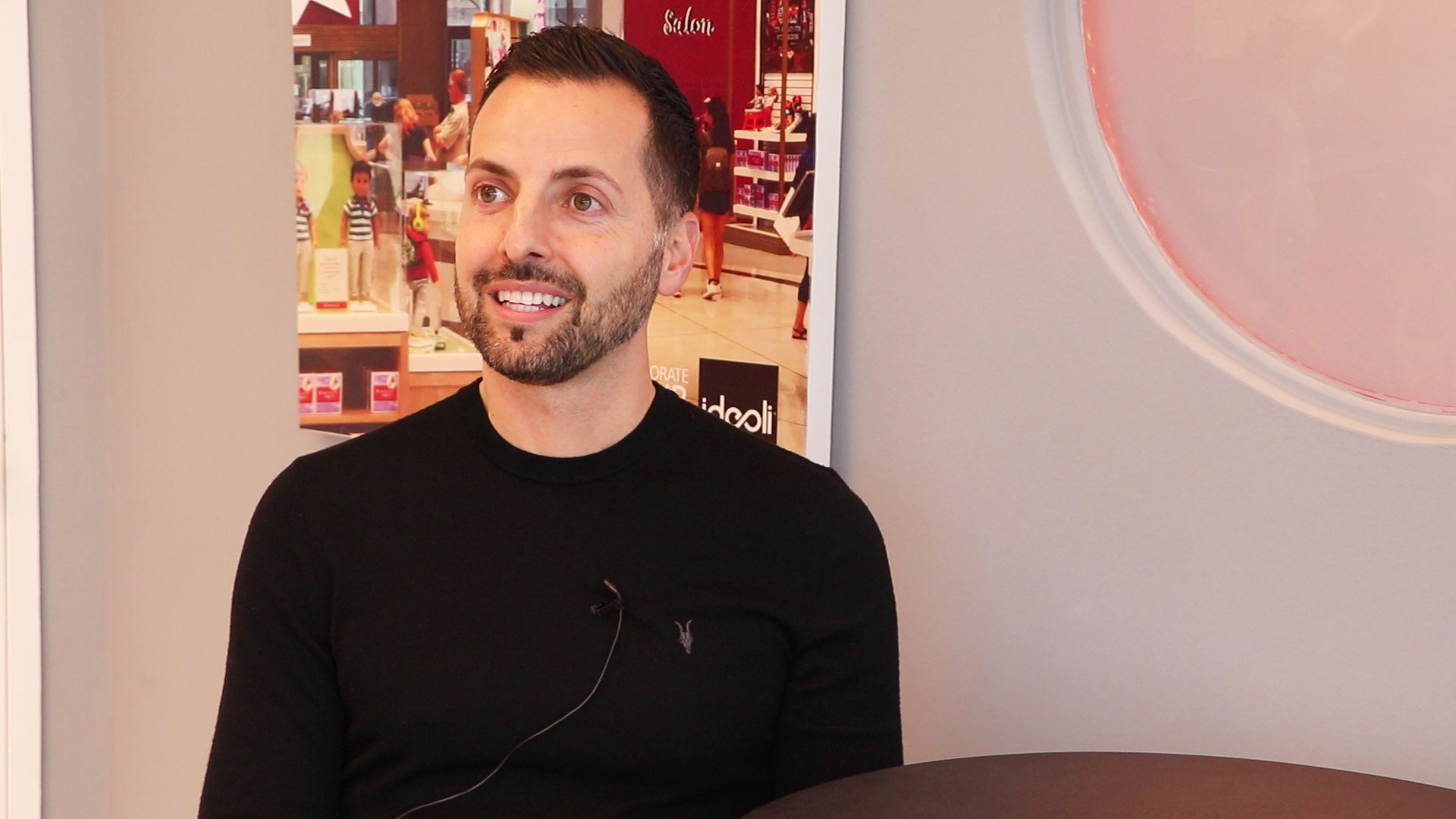
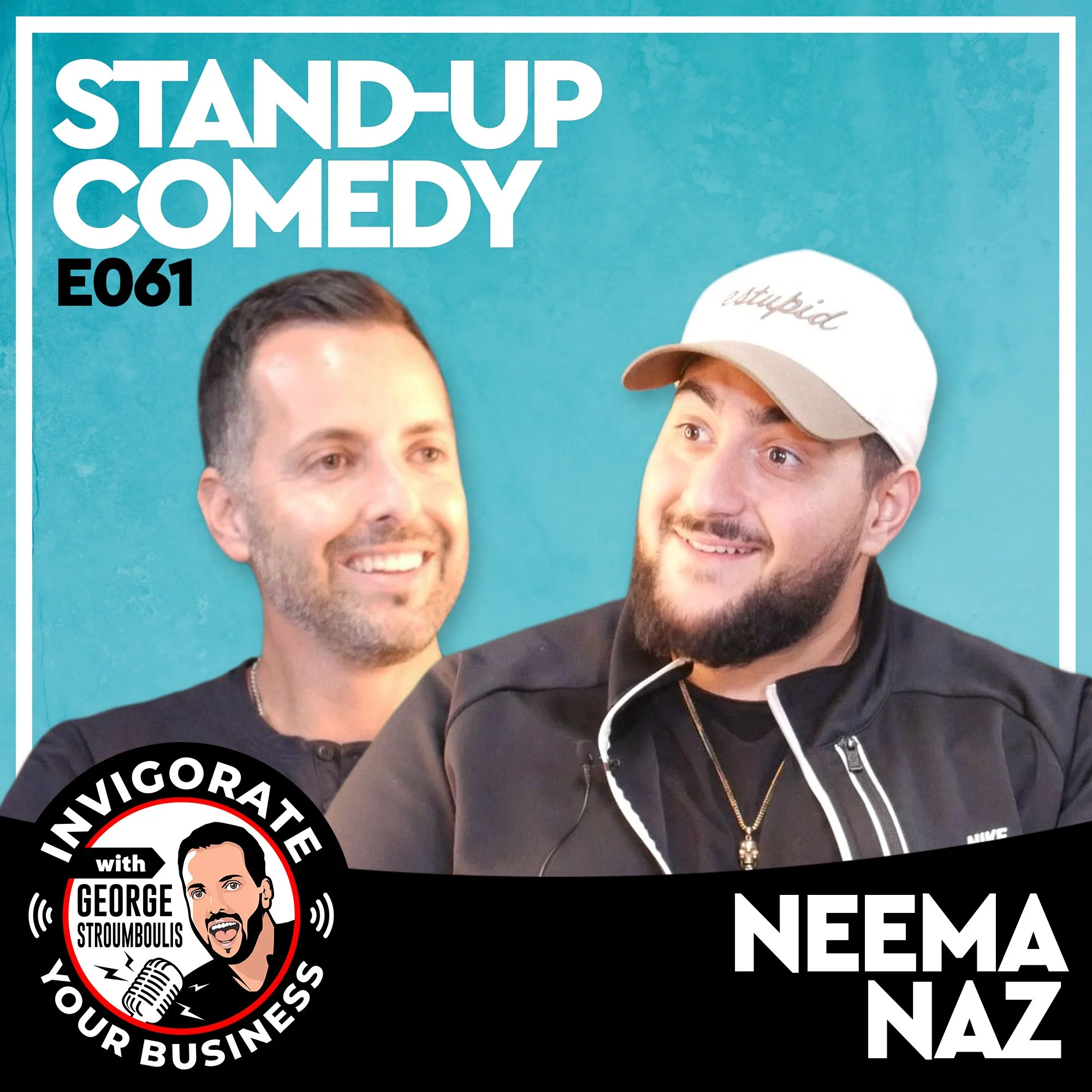
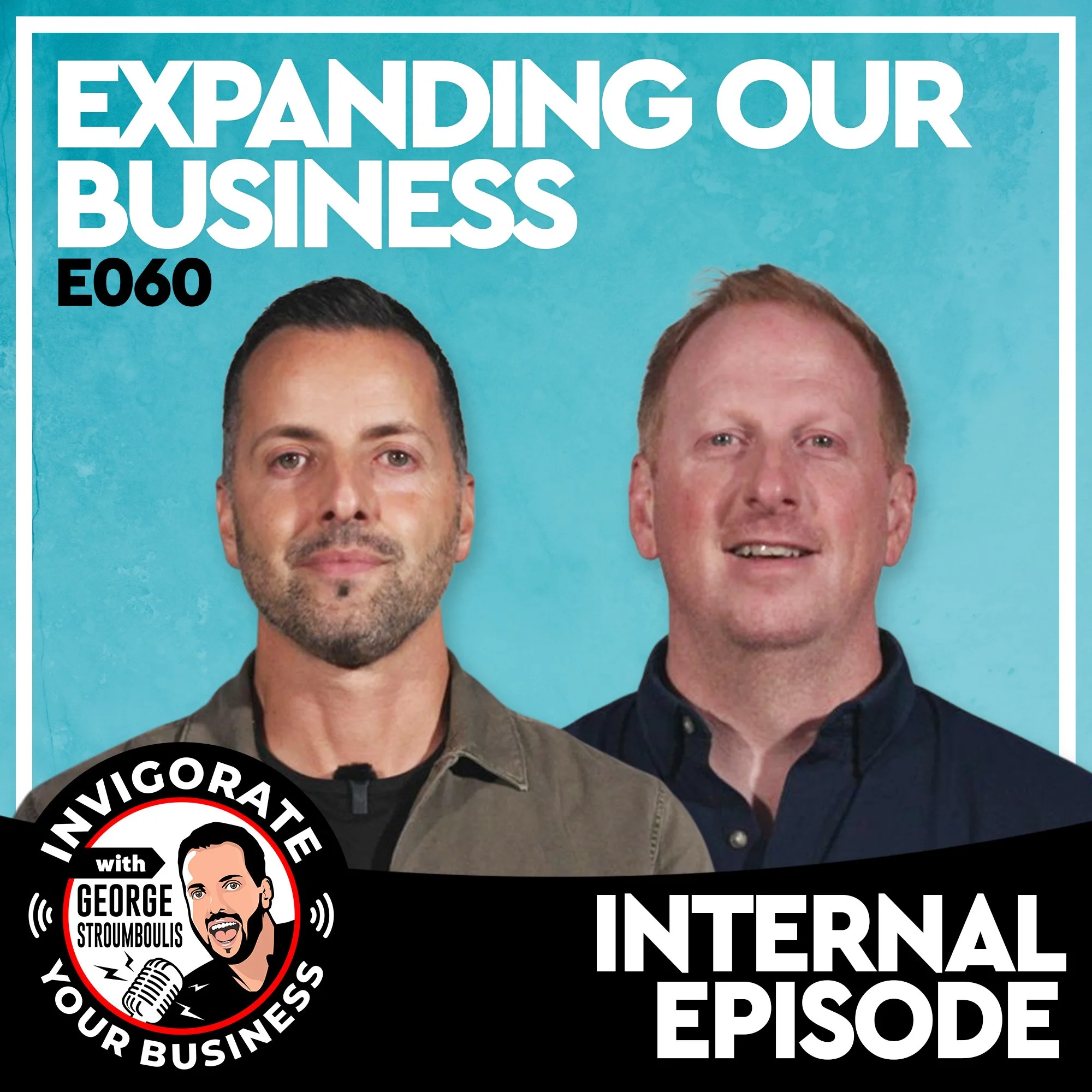
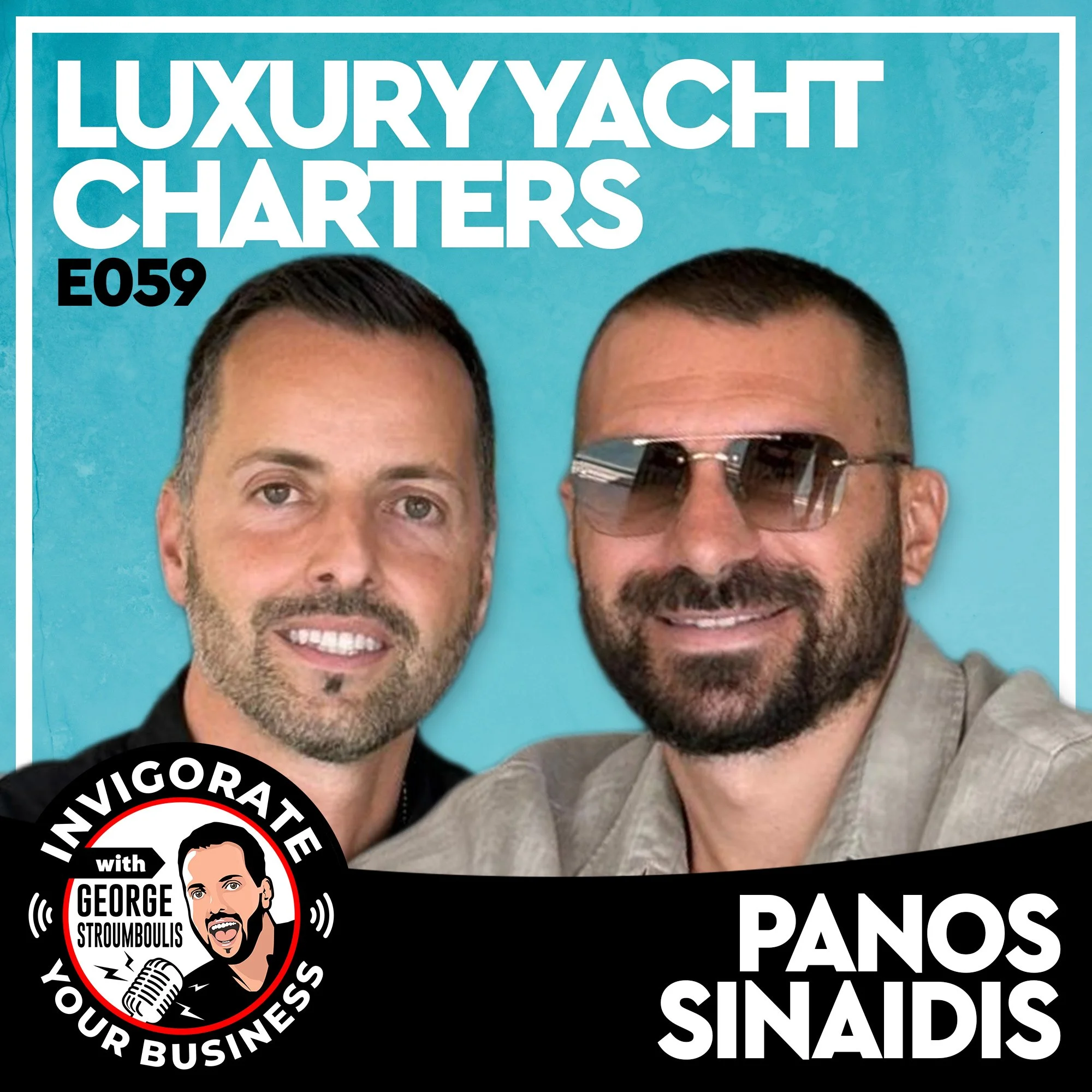
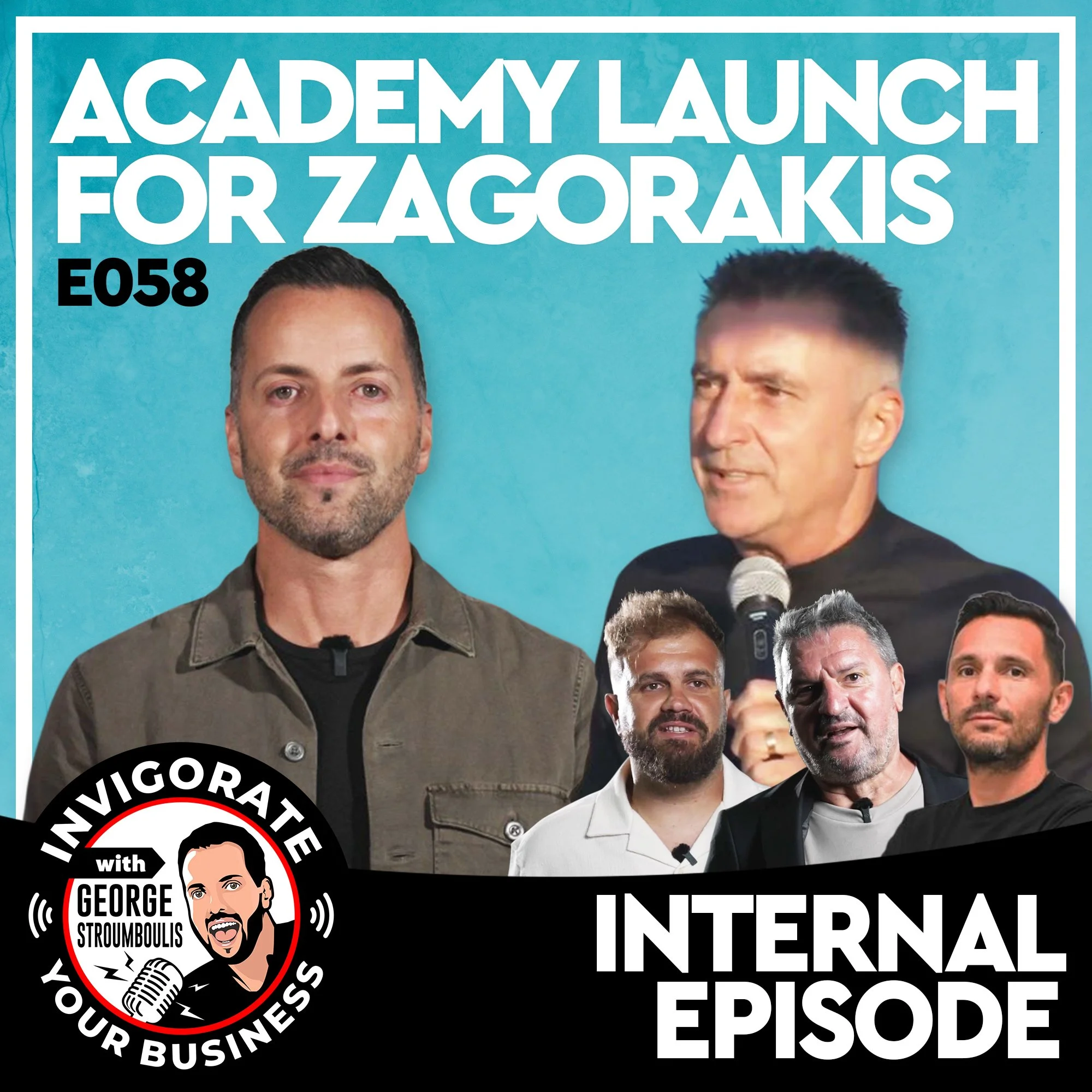



George Stroumboulis sits down with Judah Regenstreif in Newport Beach, California, for a powerhouse episode of Invigorate Your Business — diving into the world of lighting, product distribution, scaling companies, faith-driven leadership, strategic partnerships, corporate clients, family business, and so much more.